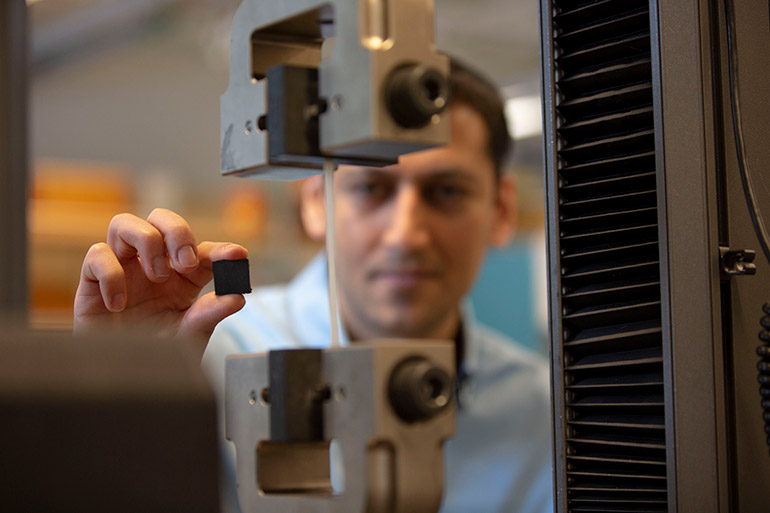
UBCO School of Engineering researcher Mohammad Arjmand examines the new polymer-based brake pad which could revolutionize braking systems in cars and trains.
Researchers look at ways to improve standard braking systems
While it’s not a case of reinventing the wheel, researchers are looking at ways to improve standard braking equipment on trains and cars.
By mixing carbon fibres into polymer-based brakes, a group of researchers at UBC Okanagan, Sharif University of Technology in Iran and the University of Toronto were able to design brakes that are self-lubricating.
These new and improved brakes can prevent wear-and-tear and have better frictional properties than brakes currently on the market, explains School of Engineering Assistant Professor Mohammad Arjmand.
“No researcher in Canada is currently working in this area,” says Arjmand, one of the lead researchers on the project, “and the work is very important for the automotive and railroad industries.”
Brake pad materials are typically available in three categories: metallic, ceramic and organic. All have benefits and weaknesses inherent to their design such as cost, durability, noise, slow response time, or increased temperature during usage, he adds.
According to statistics from the US Department of National Highway Traffic Safety Administration, the failure of vehicle components accounts for nearly two per cent of crashes and about 22 per cent of vehicle component faults are caused by brake-related problems.
“This new research looks at things like composite breakdown during high temperatures, durability, friction and wear testing,” says Arjmand. “Our findings show that the newly designed carbon fibre polymer brakes represent an acceleration in the science of deceleration and could be a real boon for the industry and consumers alike.”
Arjmand says the new technology can lead to smaller brake pads that are more efficient and cost-effective since the small pads can withstand greater friction and temperatures.
“As we continue to develop nanomaterials and mix them with polymers to develop multifunctional composite cocktails that can address issues such as friction, wear, and heat distribution at the molecular level, we will continue to help the industry evolve.”
These discoveries are helping make cars and trains more affordable, efficient and functional, he adds.
The research was recently published in Wear.
About UBC’s Okanagan campus
UBC’s Okanagan campus is an innovative hub for research and learning in the heart of British Columbia’s stunning Okanagan Valley. Ranked among the top 20 public universities in the world, UBC is home to bold thinking and discoveries that make a difference. Established in 2005, the Okanagan campus combines a globally recognized UBC education with a tight-knit and entrepreneurial community that welcomes students and faculty from around the world.
To find out more, visit: ok.ubc.ca.